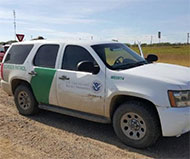Article from: www.thenewspaper.com/news/70/7084.asp
9/30/2021
Vermont Supreme Court Rejects Traffic Stop For Driving While Nervous
Vermont Supreme Court says federal agents may not violate the state constitution when conducting traffic stop and searches.
 By Richard Diamond
By Richard Diamond
Federal agents do not have the ability to conduct a traffic stop in Vermont that violates the state constitution, the state Supreme Court ruled last week. A Customs and Border Patrol agent had set up in a hidden spot near the Canadian border on August 12, 2018, when the car belonging to Phillip Walker-Brazie and Brandi-Lena Butterfield, US citizens who were on their way home to Richford on Route 105, drove past.
Border Patrol agent Jeffery Vining said that he saw the car slow down as if it had planned to turn, but instead it continued straight while the driver looked in the rear view mirror as the agent followed. The agent explained that he considered Butterfield's mirror-checking to be a nervous attempt to "avoid being stopped." So, he conducted a traffic stop.
In the course of his roadside investigation, Agent Vining asked if he could search the car. Butterfield and Walker-Brazie refused. He searched anyway, claiming he saw several bags in the car and that he smelled marijuana. The search turned up a small amount of marijuana and mushrooms. State prosecutors charged the couple with the crime of possession, which they challenged on the grounds that the Border Patrol had no business stopping US citizens who had not crossed the border, noting that the federal agent's inquiry should have stopped after Butterfield produced a Vermont vehicle registration establishing their residence.
Under federal precedent, Border Patrol agents on a roving patrol need only meet a low standard to conduct a traffic stop and vehicle search. Vermont has a long history of strictly interpreting its state constitutional equivalent of the Fourth Amendment, Article 11, which requires warrants for searches unless there are exigent circumstances.
"In this case, there is no dispute that if the search of defendants' vehicle had been conducted by Vermont law enforcement officials, the resulting evidence would have been excluded," Justice William David Cohen wrote for a divided court. "The question before us is whether the fact that the search was conducted by Border Patrol agents on roving patrol requires a different result."
The Vermont Supreme Court in the past has declined to apply state law to the conduct of federal agents at the border itself. The majority here decided this precedent did not apply to roving patrols within Vermont's interior.
"Although Border Patrol officers are acting pursuant to their authority to safeguard the border during these patrols, their authority to conduct stops and searches on inland roads -- unlike at the border -- is not limitless or exclusive," Justice Cohen concluded.
The court majority ordered the evidence against Butterfield and Walker-Brazie suppressed, but the new precedent only applies to evidence used in state court. A copy of the decision is available in a 250k PDF file at the source link below.
Source: Vermont v. Walker-Brazie (Vermont Supreme Court, 9/24/2021)
Permanent Link for this item
Return to Front Page
 By Richard Diamond
By Richard Diamond